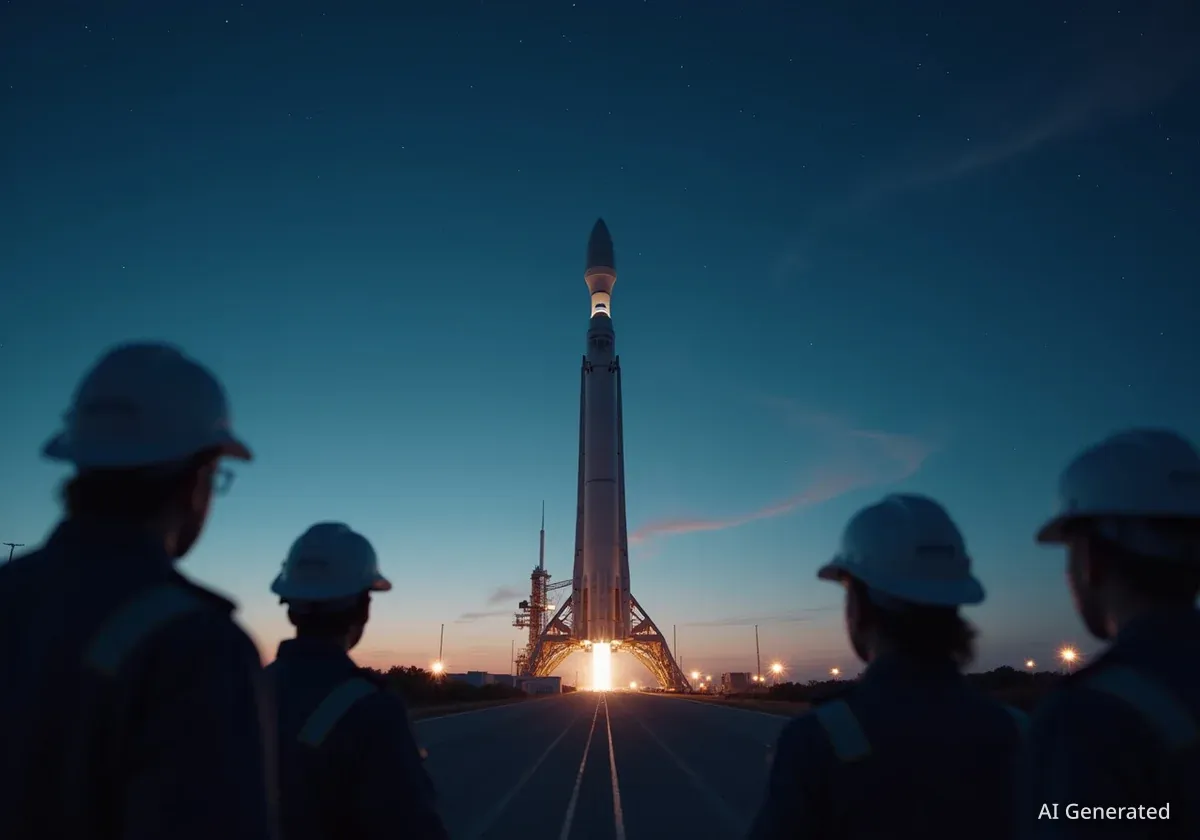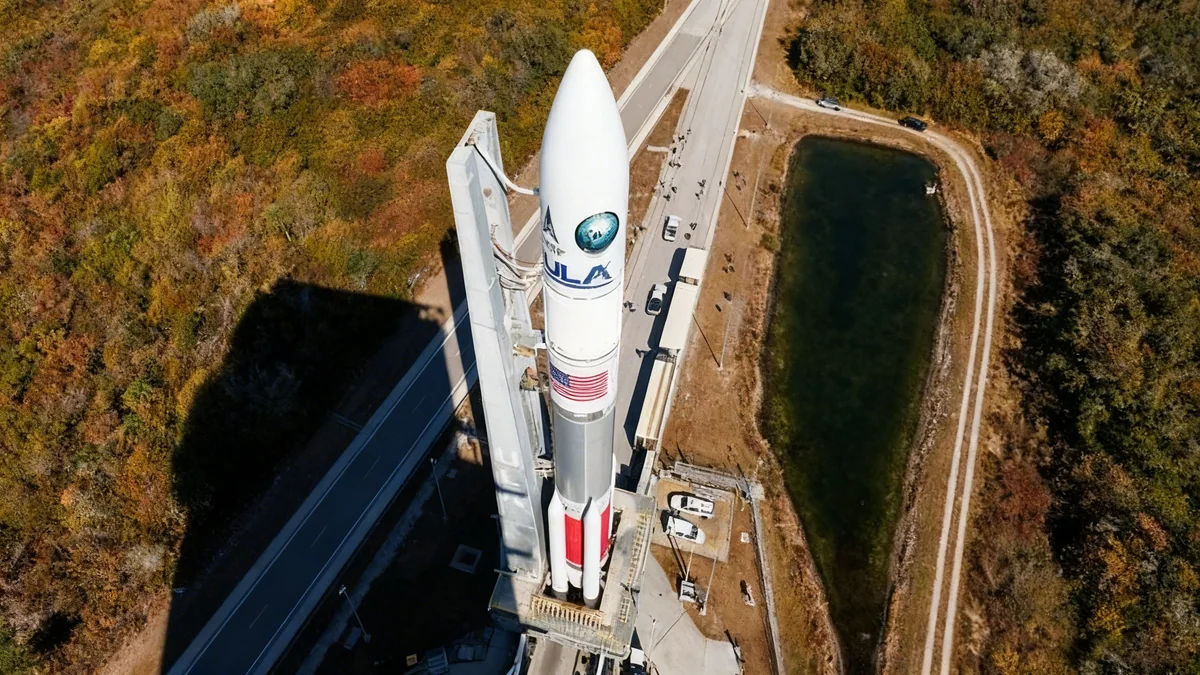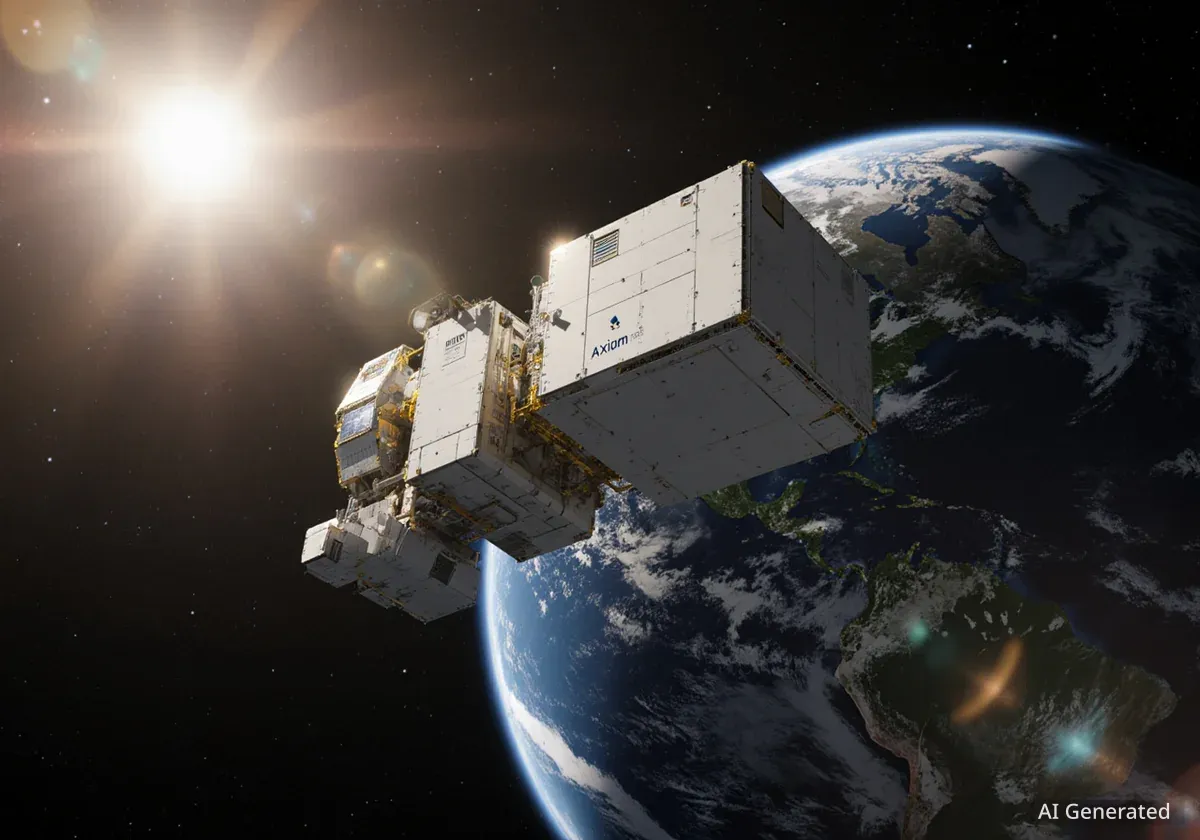The competition for dominance in space is growing between the United States and China. This rivalry extends to private space companies like SpaceX and Blue Origin, which are playing a critical role in American efforts. Both nations aim to land astronauts on the moon by 2030, marking a significant acceleration in global space exploration.
Key Takeaways
- US and China are in a renewed race to land astronauts on the moon by 2030.
- Private companies, SpaceX and Blue Origin, are central to the US strategy.
- Blue Origin is developing a larger rocket, New Armstrong, to compete with SpaceX's Starship.
- SpaceX currently leads in crewed flights and lunar lander contracts for NASA.
- Blue Origin is focusing on lunar infrastructure, including converting moon dirt into resources.
Billionaire Space Ventures Push Boundaries
Two prominent figures, Elon Musk of SpaceX and Jeff Bezos of Blue Origin, are at the forefront of the commercial space industry. Both have achieved significant milestones but also encountered challenges. Blue Origin recently launched its New Glenn heavy-lift rocket, a project that took a decade to develop. This orbital-class vehicle had its inaugural flight in January.
However, Blue Origin is already planning an even larger rocket. This new concept, known as New Armstrong, aims to rival SpaceX's Starship. Jeff Bezos has not yet revealed specific details about New Armstrong. The name New Armstrong honors Neil Armstrong, the first person to walk on the moon, while New Glenn pays tribute to John Glenn, the first American in orbit.
"They've been very quiet about it," says Christian Davenport, a staff writer for The Washington Post and author of "Rocket Dreams." "I asked Jeff specifically about that at the New Glenn launch, and he didn't want to talk about it."
Davenport's book quotes Bezos as stating, "we are working on a vehicle that will come after New Glenn and lift more mass." This suggests a significant future development for Blue Origin.
Fact: New Armstrong Concept
The idea for New Armstrong was first mentioned by Jeff Bezos in 2016. At that time, he referred to it as "a story for the future." Details remain scarce, highlighting the secretive nature of its development.
A Broader International Competition
The rivalry between SpaceX and Blue Origin is part of a larger international competition. The United States and China are both aiming to send astronauts to the moon by 2030, or potentially even sooner. This goal reflects a renewed global space race. Acting NASA Administrator Sean Duffy emphasized this ambition recently.
During a public introduction of 10 new astronaut candidates, Duffy stated, "I'll be damned if the Chinese beat NASA, or beat America, back to the moon." This strong sentiment underscores the high stakes involved in the current space endeavors. President Donald Trump also expressed high expectations, stating during his inaugural address that it was "our manifest destiny" for US astronauts to plant the American flag on Mars. Elon Musk, present at the address, reacted positively.
Historical Context: The First Space Race
During the original space race in the 1960s, NASA was solely responsible for America's efforts. Today, the landscape has changed. NASA relies more than ever on private companies to achieve its goals for lunar and Martian exploration. This shift highlights the growing importance of commercial space ventures.
SpaceX Leads, Blue Origin Accelerates
Currently, SpaceX holds a significant lead in several key areas. Since 2020, SpaceX has been transporting astronauts for NASA. The company also secured a multi-billion-dollar contract to land the first crew on the moon for NASA's Artemis program, an achievement that predates Blue Origin's similar contract.
Christian Davenport's book, "Rocket Dreams," notes that SpaceX's dominance has been a source of frustration for Jeff Bezos. Reports have suggested that Bezos, known for his demanding approach at Amazon, has pushed Blue Origin to accelerate its progress. Two years ago, Bezos appointed Dave Limp, a former Amazon VP, as Blue Origin's CEO. New Glenn's first launch occurred just over a year after Limp took leadership.
Despite this, Blue Origin faces ongoing challenges. The second launch of New Glenn, intended to send two orbiters to Mars for NASA, has experienced multiple delays. "They still have a lot to prove, and they're still really, really far behind SpaceX," Davenport observed. "I think Amazon Jeff is probably frustrated and wants to move faster."
SpaceX Milestones:
- Flying astronauts for NASA since 2020.
- Secured initial NASA contract for Artemis lunar crew landing.
- Successfully performed a spectacular catch of the Super Heavy booster in October.
Lunar Landers and Off-World Infrastructure
SpaceX's Starship development has faced its own timeline challenges. While Musk's projections are often optimistic, some experts question whether a modified Starship upper stage can land the Artemis 3 crew on the lunar surface by NASA's 2027 target date. Davenport is among those who express doubt. "Pretty much everyone knows that that's highly unlikely," he commented.
Blue Origin is also making strides with its Blue Moon lunar landing system. This system received a NASA contract two years after SpaceX won the initial lunar lander competition. The Blue Moon MK1 lander is scheduled for an uncrewed test mission to the moon within the next year. This could mean Blue Moon reaches the lunar surface before Starship.
Beyond launch and landing, Blue Origin is investing in moon-related projects. Davenport visited a secret lab where engineers are working on Blue Alchemist. This project focuses on converting moon dirt into essential resources like breathable oxygen, solar cells, and transmission wire. Blue Alchemist received $34.7 million in NASA funding in 2023 and recently passed a critical design review.
"You hear Elon talk about, yeah, we're going to build a city on Mars. But what technologies are you working on to make us have a sustainable presence there?" Davenport pondered, suggesting Blue Origin might be ahead in developing off-world infrastructure.
Future of the Space Race
While "Rocket Dreams" primarily focuses on Musk and Bezos, it briefly touches on other commercial space players. Richard Branson's Virgin Galactic, for example, garnered attention for its suborbital spaceflight in 2021. However, the book does not delve deeply into the "second wave" of space startups. Davenport is particularly interested in Kent, Washington-based Stoke Space, which is developing a reusable rocket.
"They're moving incredibly fast, and everything you hear about their progress is very, very positive," he said. He emphasized that while hype surrounds these companies, ultimately, they must prove their capabilities through successful flights.
Looking ahead, the role of the US administration and the future of NASA's Artemis program are critical. Davenport recounts an instance where NASA officials had to inform then-President Trump about a launch postponement due to unsafe conditions. The question remains whether political pressure could compromise safety in the push to beat China to the moon.
National Security in Space
The new space race is driven by more than just exploration and prestige. Space is increasingly seen as a critical domain for national security. Threats from drones, hypersonic weapons, and satellite killers highlight its importance. This echoes the strategic significance of space during the Cold War era.
Davenport believes that civil space efforts and national security space, particularly with the Pentagon, will become more intertwined in the coming years. "Because I think the idea that space is a warfighting domain and a contested environment — that is here, unfortunately, and we are seeing that," he concluded.
Christian Davenport will discuss "Rocket Dreams" and the evolving space race at Seattle's Museum of Flight on October 1. Alan Boyle will moderate the event. Additional book tour events are scheduled in Chicago, Orlando, Florida, and Huntsville, Alabama.





